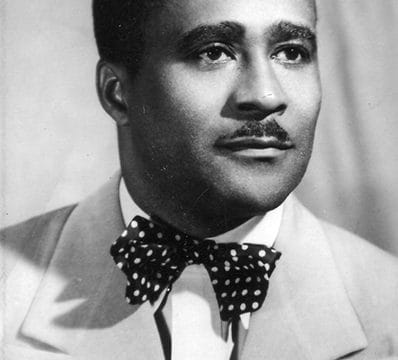Autherine Lucy
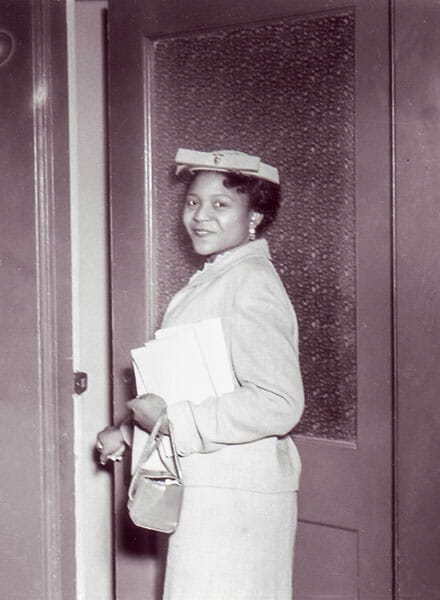 Autherine Lucy, 1956
Autherine Lucy Foster (1929-2022) was the first African American to be enrolled at the University of Alabama (UA), in 1952. When school administrators found out her race, she was denied admittance but reenrolled in 1956 after a three-year court battle. Mob violence on campus led to her expulsion after two days by university officials, however, under the guise of protecting her safety. Lucy briefly travelled as a public speaker at civil rights meetings and rallies.
Autherine Lucy, 1956
Autherine Lucy Foster (1929-2022) was the first African American to be enrolled at the University of Alabama (UA), in 1952. When school administrators found out her race, she was denied admittance but reenrolled in 1956 after a three-year court battle. Mob violence on campus led to her expulsion after two days by university officials, however, under the guise of protecting her safety. Lucy briefly travelled as a public speaker at civil rights meetings and rallies.
Lucy was born as Autherine Juanita Lucy on October 5, 1929, in Shiloh, Marengo County, the last of 10 children; her parents were Milton Cornelius Lucy and Minnie Maud Hosea. The family owned and farmed 110 acres, and Lucy’s father also did blacksmithing and made baskets and ax handles to supplement their income. A good student, Lucy graduated from Linden Academy in Linden, Marengo County, where she boarded during the week in her final two years of high school. She attended Selma University and received a two-year teaching certificate. Unable to get a job because the state recently had begun requiring a four-year degree for a full-time teaching position, she entered Miles College in Birmingham in 1949 and graduated with a bachelor’s degree in English in 1952.
That same year, Lucy was contacted by friend Pollie Anne Myers, whom she had met in a public speaking class at Miles, about enrolling in graduate school at UA with her. Lucy somewhat reluctantly went along with the idea, enrolling in the master of education program. Myers and Lucy requested and received admission forms in early September and applied and were accepted by September 13, receiving dorm assignments after sending in five-dollar deposits; admissions officials at the university had no idea that they were African American. Lucy and Myers retained a lawyer working for the National Association for the Advancement of Colored People (NAACP), Arthur Shores, in anticipation of the inevitable rejection of their enrollment, which occurred on September 19 when the Admissions Office discovered that they were black. When the women showed up at the Admissions Office, they were told by Dean of Admissions William F. Adams that they could not be enrolled, although he would not state that it was because of their race. He tried to refund their deposits.
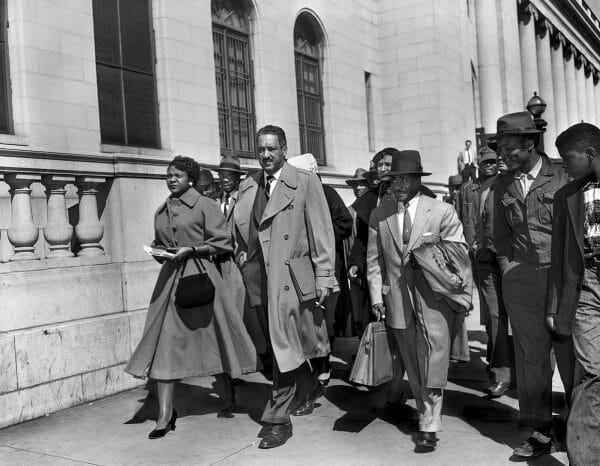 Autherine Lucy, Thurgood Marshall, and Arthur Shores
The incident initiated what would become a three-year journey through the court system. In the interim, Lucy took a position teaching English at Conway Vocational High School in Carthage, Mississippi. In 1955, the Brown vs. Board of Education decision outlawing segregation came down from the U.S. Supreme Court, and it became clear to Shores and the NAACP that the Myers/Lucy case would be the first test. Recognizing this, UA administrators hired private investigators to probe into Myers’s and Lucy’s backgrounds; they found that Myers had been pregnant but not married before she applied for admission. The case went before federal Judge Harlan Grooms on June 29, 1955. After only a single day of testimony, Grooms ruled for Myers and Lucy and later extended the ruling to all such cases.
Autherine Lucy, Thurgood Marshall, and Arthur Shores
The incident initiated what would become a three-year journey through the court system. In the interim, Lucy took a position teaching English at Conway Vocational High School in Carthage, Mississippi. In 1955, the Brown vs. Board of Education decision outlawing segregation came down from the U.S. Supreme Court, and it became clear to Shores and the NAACP that the Myers/Lucy case would be the first test. Recognizing this, UA administrators hired private investigators to probe into Myers’s and Lucy’s backgrounds; they found that Myers had been pregnant but not married before she applied for admission. The case went before federal Judge Harlan Grooms on June 29, 1955. After only a single day of testimony, Grooms ruled for Myers and Lucy and later extended the ruling to all such cases.
As the women moved toward enrollment in January 1956, the university used the fact of Meyers’s pregnancy outside of marriage to deny her admission. The university board of trustees supported this denial in its meeting on January 29, but confirmed Lucy’s admission with only one dissenting vote. Both women received notice of their respective acceptance and rejection on January 30, one day before official enrollment, and Lucy suddenly found herself facing the prospect of continuing on her journey without the person who persuaded her to undertake it in the first place.
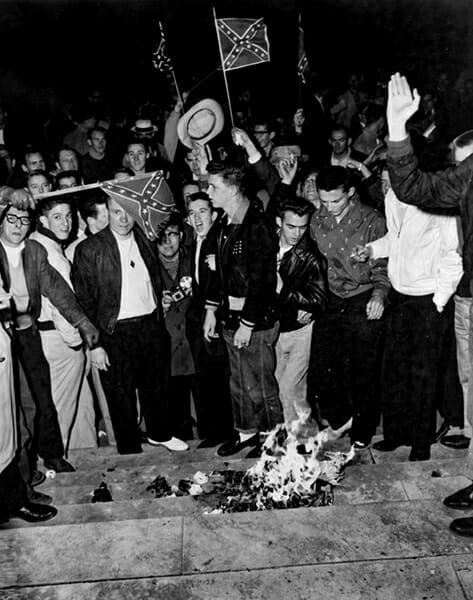 Desegretation Protest at UA, 1956
On February 1, 1956, Lucy was walked through the enrollment process by university officials and paid her fees, officially enrolling at the university. The only false note on her first day came when she was told that the trustees had denied her a room in a dormitory, which her advisor Emory Jackson vowed to fight. Grooms suggested that if Lucy could find room and board off campus, that would be satisfactory, over Arthur Shores’s protests. With moderate police presence, Lucy successfully attended her first day of classes on February 3. That night and the following evening (Friday and Saturday), however, increasingly agitated groups of white university students began marching and speaking on campus. Although Lucy’s second day of classes on February 4 also passed without notable incident, on Monday, February 6, she passed through a hostile crowd of around 300 white protestors on the way to her first class. By the time that class ended, she was urged by university officials to travel by car to her next class because of the mob gathering outside. Eyewitness reports at the time said that while most of the crowd was made up of students, at least some of the more strident elements looked either much older or much younger.
Desegretation Protest at UA, 1956
On February 1, 1956, Lucy was walked through the enrollment process by university officials and paid her fees, officially enrolling at the university. The only false note on her first day came when she was told that the trustees had denied her a room in a dormitory, which her advisor Emory Jackson vowed to fight. Grooms suggested that if Lucy could find room and board off campus, that would be satisfactory, over Arthur Shores’s protests. With moderate police presence, Lucy successfully attended her first day of classes on February 3. That night and the following evening (Friday and Saturday), however, increasingly agitated groups of white university students began marching and speaking on campus. Although Lucy’s second day of classes on February 4 also passed without notable incident, on Monday, February 6, she passed through a hostile crowd of around 300 white protestors on the way to her first class. By the time that class ended, she was urged by university officials to travel by car to her next class because of the mob gathering outside. Eyewitness reports at the time said that while most of the crowd was made up of students, at least some of the more strident elements looked either much older or much younger.
Lucy and her escorts found themselves surrounded by angry white students, who pelted them with rotten eggs as they made their way to the car. Lucy arrived at her second class safely, but once she was inside, her driver was forced to take the car and flee from the crowd that had swelled to more than 2,000. At the end of her second class, Lucy had to wait for more than two hours for a way to safely leave the campus. When the crowd moved to Denny Chimes, Lucy was taken to a waiting patrol car, which sped away from campus with her lying hidden in the back seat. That same night, the University of Alabama’s Board of Trustees voted to exclude Lucy from the university, ostensibly for her own safety.
Attorneys for Lucy and the NAACP, including Shores and Thurgood Marshall, filed a complaint accusing the university of conspiring with the mob to prevent Lucy from attending classes. Outraged, on February 28, the university trustees voted to permanently expel Lucy for her part in the conspiracy charges; the complaint was subsequently withdrawn, but the expulsion stood. Judge Grooms issued an order for Lucy’s readmission on February 29, but he refused to overturn the trustees’ decision to expel Lucy. Lucy’s attempt to attend classes at the university had failed; it would be another seven years before African Americans were granted admission after George Wallace’s notorious “stand in the schoolhouse door”.
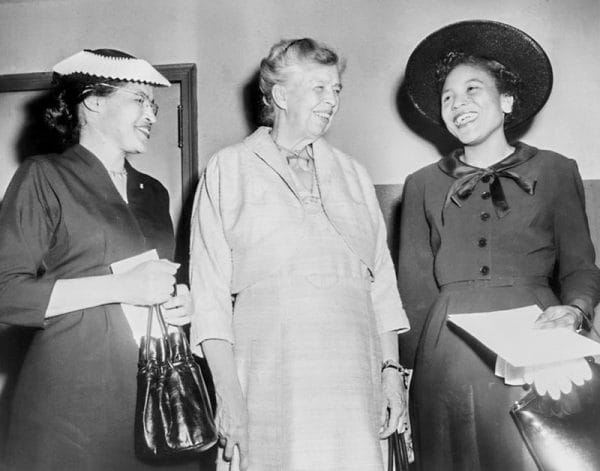 Rosa Parks, Eleanor Roosevelt, and Autherine Lucy Foster
On April 22, 1956, Lucy married Hugh Lawrence Foster, a divinity student at Bishop College in Tyler, Texas, whom she had known from Miles College, and moved with him to Texas. They would have four children, two of whom eventually attended the University of Alabama. Lucy made a few speeches at NAACP events in Texas and Philadelphia, but such engagements waned as she fell out of the public eye. After living in Louisiana and Texas, the couple returned to Alabama in 1974, where Foster took a position as pastor of the New Zion Baptist Church in Bessemer, Jefferson County. In 1988, the University of Alabama’s board of trustees voted to overturn its expulsion of Lucy, and she enrolled and received her master’s degree in education on May 9, 1992. The university has named an endowed scholarship after her and placed her portrait in the Ferguson Center on campus. On May 4, 2019, UA awarded Foster an honorary doctorate. Lucy died in Birmingham on March 3, 2022.
Rosa Parks, Eleanor Roosevelt, and Autherine Lucy Foster
On April 22, 1956, Lucy married Hugh Lawrence Foster, a divinity student at Bishop College in Tyler, Texas, whom she had known from Miles College, and moved with him to Texas. They would have four children, two of whom eventually attended the University of Alabama. Lucy made a few speeches at NAACP events in Texas and Philadelphia, but such engagements waned as she fell out of the public eye. After living in Louisiana and Texas, the couple returned to Alabama in 1974, where Foster took a position as pastor of the New Zion Baptist Church in Bessemer, Jefferson County. In 1988, the University of Alabama’s board of trustees voted to overturn its expulsion of Lucy, and she enrolled and received her master’s degree in education on May 9, 1992. The university has named an endowed scholarship after her and placed her portrait in the Ferguson Center on campus. On May 4, 2019, UA awarded Foster an honorary doctorate. Lucy died in Birmingham on March 3, 2022.
Additional Resources
Clark, E. Culpepper. The Schoolhouse Door: Segregation’s Last Stand at the University of Alabama. New York: Oxford University Press, 1993.
Lanker, Brian. I Dream a World: Portraits of Black Women Who Changed America. New York: Stewart, Tabori & Chang, 1999.
Sayre, Nora. Previous Convictions: A Journey Through the 1950s. New Brunswick, N.J.: Rutgers University Press, 1995.

